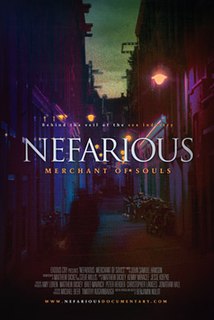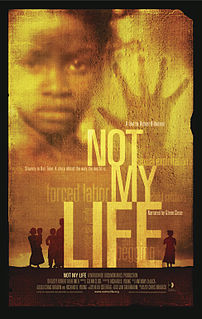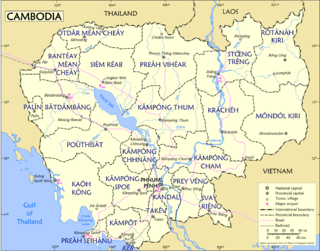Related Research Articles

Sexual slavery and sexual exploitation is attaching the right of ownership over one or more people with the intent of coercing or otherwise forcing them to engage in sexual activities. This includes forced labor, reducing a person to a servile status and sex trafficking persons, such as the sexual trafficking of children.

Sex trafficking is human trafficking for the purpose of sexual exploitation, including sexual slavery, which is considered a form of modern slavery. A victim is forced, in one of a variety of ways, into a situation of dependency on their trafficker(s) and then used by the trafficker(s) to perform sexual services to customers. Sex trafficking crimes can involve acquisition, transportation and exploitation; this includes child sex tourism (CST), domestic minor sex trafficking (DMST) or other kinds of commercial sexual exploitation of children, and prostitution.

Somaly Mam is a Cambodian anti-trafficking advocate who focuses primarily on sex trafficking. From 1996 to 2014, Mam was involved in campaigns against sex trafficking. She set up the Somaly Mam Foundation, raised money, appeared on major television programs, and spoke at many international events.

Cambodia is a source, transit, and destination country for human trafficking. The traffickers are reportedly organized crime syndicates, parents, relatives, friends, intimate partners, and neighbors. Despite human trafficking being a crime in Cambodia, the country has a significant child sex tourism problem; some children are sold by their parents, while others are lured by what they think are legitimate job offers like waitressing, but then are forced into prostitution. Children are often held captive, beaten, and starved to force them into prostitution.
Laura J. Lederer is a pioneer in the work to stop human trafficking. She is a legal scholar and former Senior Advisor on Trafficking in Persons in the Office for Democracy and Global Affairs of the United States Department of State. She has also been an activist against human trafficking, prostitution, pornography, and hate speech. Lederer is founder of The Protection Project, a legal research institute at Johns Hopkins University devoted to combating trafficking in persons.

Human trafficking is a modern form of slavery, with illegal smuggling and trading of people, for forced labor or sexual exploitation.

Sunitha Krishnan is an Indian social activist and chief functionary and co-founder of Prajwala, a non-governmental organization that rescues, rehabilitates and reintegrates sex-trafficked victims into society.
Human trafficking in popular culture refers to depictions of human trafficking, the illegal trade of human beings for the purposes of reproductive slavery, commercial sexual exploitation, forced labor, or a modern-day form of slavery. It has been featured in a variety of popular culture forms and on numerous occasions. This topic has been discussed more and more around the world within the past several years.

Human trafficking in California is the illegal trade of human beings for the purposes of reproductive slavery, commercial sexual exploitation, and forced labor as it occurs in the state of California. Human trafficking, widely recognized as a modern-day form of slavery, includes
"the recruitment, transportation, transfer, harboring or receipt of persons by means of threat or use of force or other forms of coercion, of abduction, of fraud, of deception, of the abuse of power, or of a position of vulnerability or of the giving or receiving of payments or benefits to achieve the consent of a person having control over another person, for the purpose of exploitation. Exploitation shall include, at a minimum, the exploitation of prostitution of others or other forms of sexual exploitation, forced labor services, slavery or practices similar to slavery, servitude or the removal of organs."

Nefarious: Merchant of Souls is a 2011 American documentary film about modern human trafficking, specifically sexual slavery. Presented from a Christian worldview, Nefarious covers human trafficking in the United States, Western and Eastern Europe, and Southeast Asia, alternating interviews with re-enactments. Victims of trafficking talk about having been the objects of physical abuse and attempted murder. Several former prostitutes talk about their conversion to Christianity, escape from sexual oppression, and subsequent education or marriage. The film ends with the assertion that only Jesus can completely heal people from the horrors of sexual slavery.

Not My Life is a 2011 American independent documentary film about human trafficking and contemporary slavery. The film was written, produced, and directed by Robert Bilheimer, who had been asked to make the film by Antonio Maria Costa, executive director of the United Nations Office on Drugs and Crime. Bilheimer planned Not My Life as the second installment in a trilogy, the first being A Closer Walk and the third being the unproduced Take Me Home. The title Not My Life came from a June 2009 interview with Molly Melching, founder of Tostan, who said that many people deny the reality of contemporary slavery because it is an uncomfortable truth, saying, "No, this is not my life."
Operation Stormy Nights was an early major anti-human-trafficking operation by the Federal Bureau of Investigation (FBI). Operations took place in Oklahoma and brought to light organized crime networks trafficking female minors along United States Numbered Highways, where the girls were forced into prostitution to service truck drivers.
Bukola Oriola is a Nigerian-American journalist. She lives in Anoka County, Minnesota, and has a son named Samuel Jacobs. She spent six years as a journalist covering education in Nigeria while still living in that country. In 2005, she came to the United States from Nigeria on a two-month work permit in order to cover a New York City meeting of the United Nations General Assembly. She married a US citizen who prevented her from establishing interpersonal relationships with anyone other than himself. He subjugated her to a life of unfree labour, confiscating all of her earnings. She was imprisoned in her home in this manner for two years. Bukola is a speaker, author, mentor, advocate, and entrepreneur.

Florrie R. Burke, M.Ed., MA, LMFT, is a human rights advocate, specializing in combating human trafficking. Secretary of State John Kerry presented Ms. Burke with the inaugural Presidential Award for Extraordinary Efforts to Combat Trafficking in Persons in May 2013. The Award was granted in recognition of “her sustained dedication and unparalleled leadership in combating modern slavery through the development and delivery of comprehensive services, the empowerment of survivors to move from slavery to independence, and the transformation of policy to eradicate all forms of human trafficking.”

Chloe Won who is known professionally as Chloe Flower is an American-born composer, writer, producer and classical pianist. She studied at Manhattan School of Music Pre-College and later at The Juilliard School.

Sex trafficking in the United States is a form of human trafficking which involves reproductive slavery or commercial sexual exploitation as it occurs in the United States. Sex trafficking includes the transportation of persons by means of coercion, deception and/or force into exploitative and slavery-like conditions, and is commonly associated with organized crime.
Sex trafficking in China is human trafficking for the purpose of sexual exploitation and slavery that occurs in the People's Republic of China. China, the world's most populous country, has the second highest number of human trafficking victims in the world. It is a country of origin, destination, and transit for sexually trafficked persons.
Sex trafficking in Vietnam is human trafficking for the purpose of sexual exploitation and slavery that occurs in the Socialist Republic of Vietnam. Although India, China and Pakistan are amongst the worst perpetrators of trafficking, Vietnam is a source and, to a lesser extent, destination country for sexually trafficked persons.

Sex trafficking in Cambodia is human trafficking for the purpose of sexual exploitation and slavery that occurs in the Kingdom of Cambodia. Cambodia is a country of origin, destination and transit for sex trafficked persons.
References
- ↑ Nancy Keefe Rhodes (2012). "Not My Life: Filmmaker Robert Bilheimer's Latest Meditation on Good and Evil" (PDF). Stone Canoe : 8. Retrieved August 6, 2013.
- ↑ "Hope Drives Human Trafficking Survivor Lauded By Obama at CGI". The Daily Beast . September 27, 2012. Retrieved September 8, 2013.
- ↑ "Former Child Trafficking Victim Now Mentors Others". NPR . August 4, 2013. Retrieved September 8, 2013.
- ↑ Peter Fedynsky (February 6, 2011). "Human Trafficking Isn't Just Across Borders". Voice of America . Retrieved September 8, 2013.
- ↑ "Victim of Local Human Trafficking Shares Her Tale of Survival". NY1 . February 2, 2011. Archived from the original on October 23, 2013. Retrieved September 8, 2013.
- ↑ Kristen Welker (September 25, 2012). "Obama calls to fight human trafficking". NBC News . Retrieved September 8, 2013.
- 1 2 John Dankosky (April 17, 2013). Human Trafficking: Modern Day Slavery. Connecticut Public Radio . Retrieved August 21, 2013.
- ↑ Victoria Aronson (March 21, 2013). "Documentary by Oscar nominee Robert Bilheimer explores child trafficking". The Brandeis Hoot. Archived from the original on October 23, 2013. Retrieved September 8, 2013.
- ↑ "Disrupting Slavery Symposium". Somaly Mam Foundation. June 27, 2013. Archived from the original on August 31, 2013. Retrieved September 8, 2013.
- ↑ "Sheila White: Girls Education & Mentoring Service (GEMS)". Worldwide Documentaries. Archived from the original on July 3, 2013. Retrieved September 8, 2013.